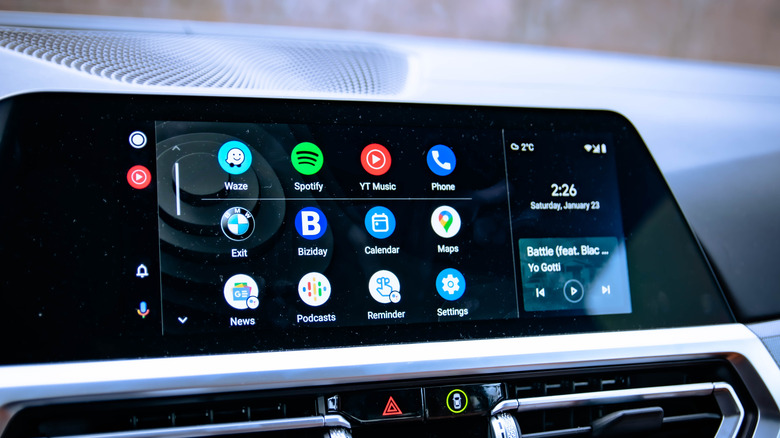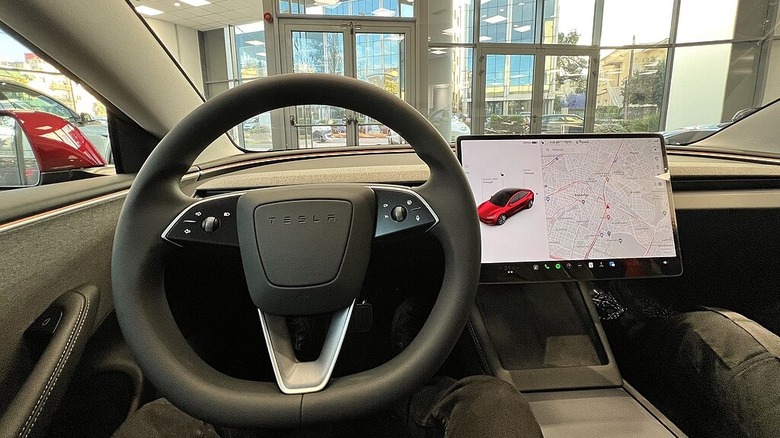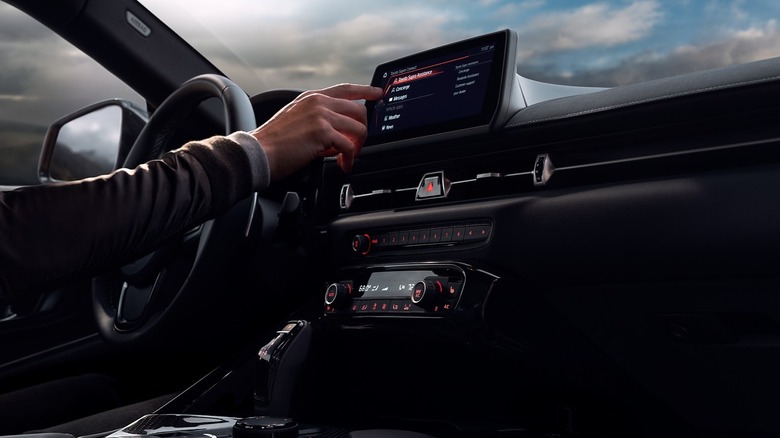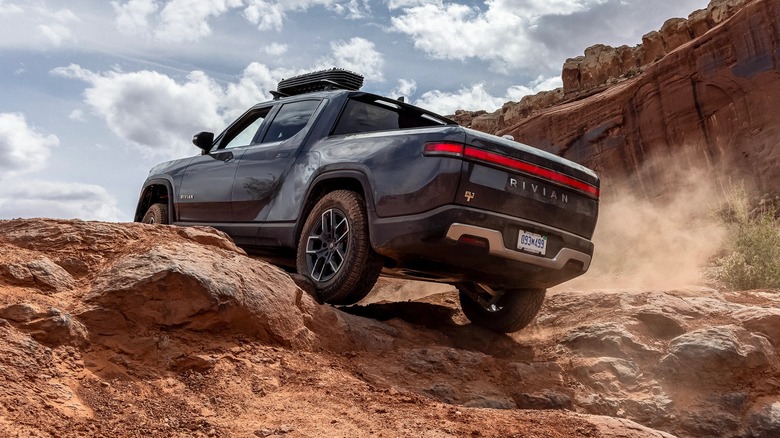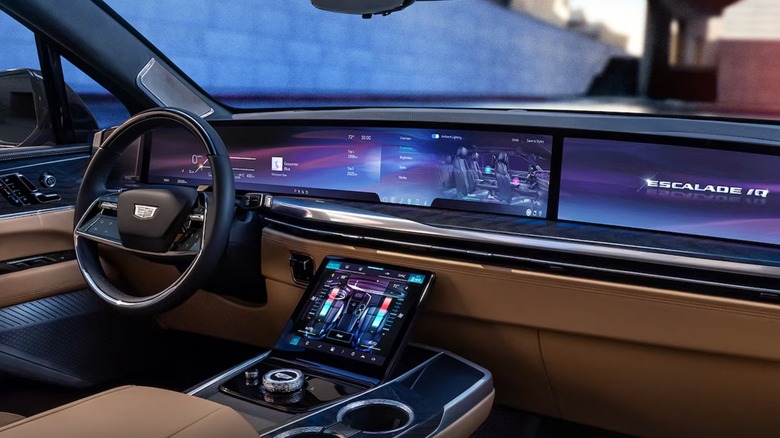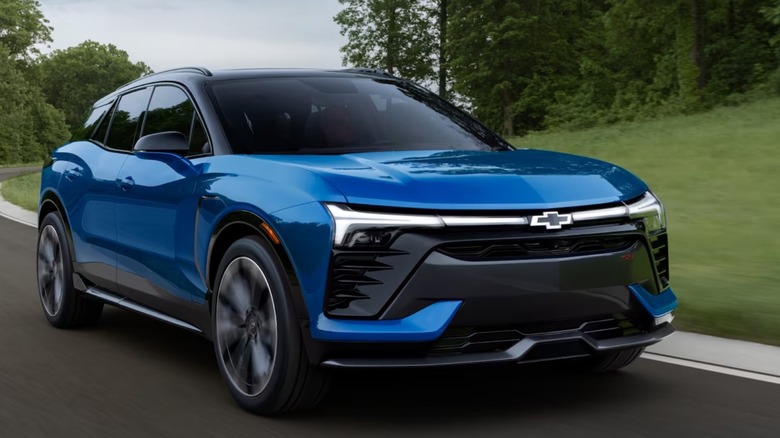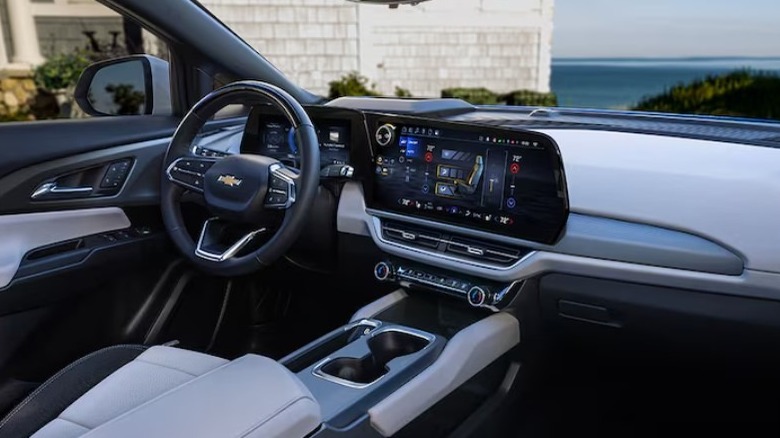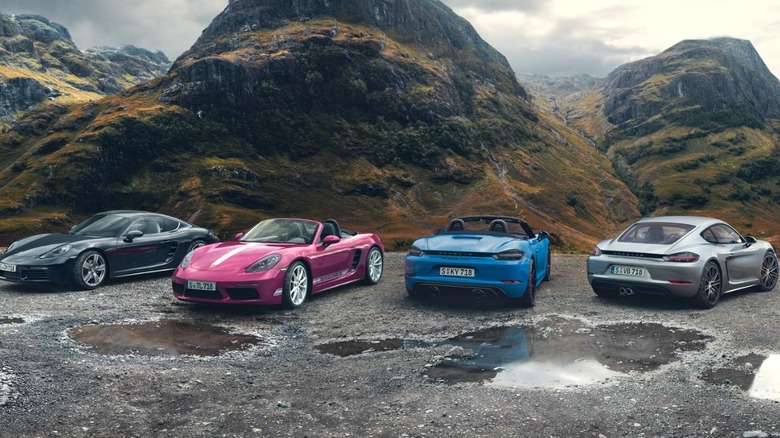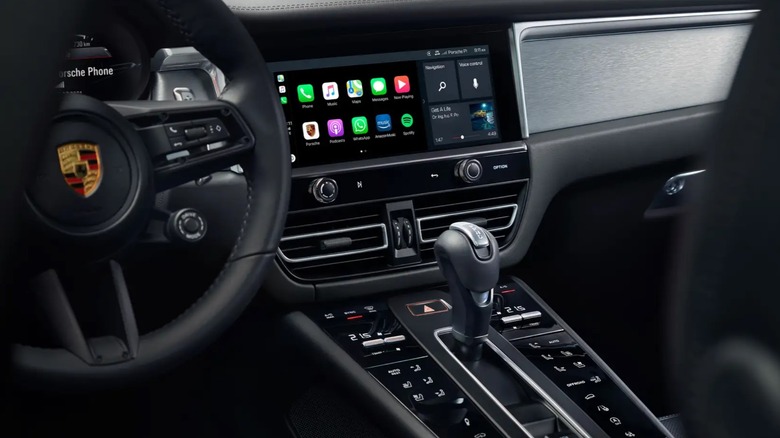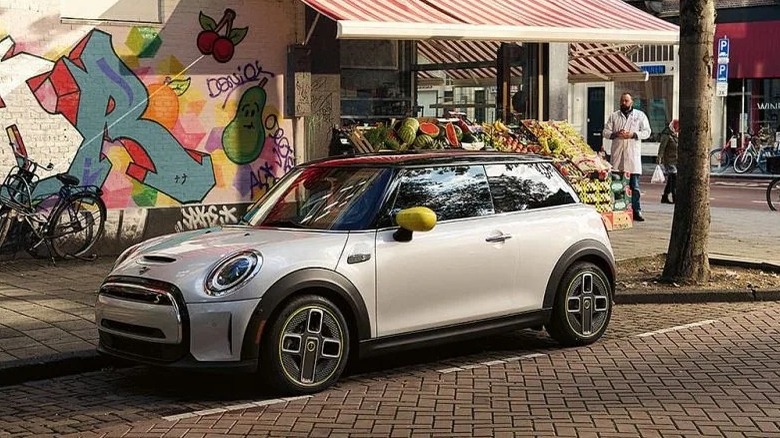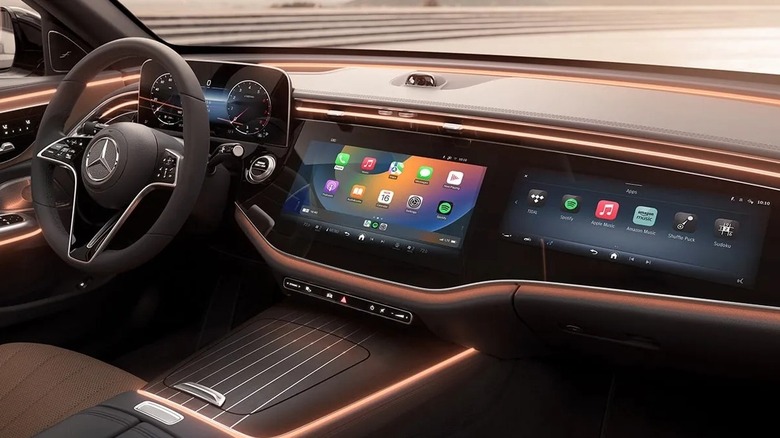10 New Cars That Still Don't Have Android Auto In 2024
Gone are the days of carrying an aux cord to play music in the car are long gone for most drivers. These days, Android Auto and Apple CarPlay are nearly equally prevalent, offering convenience and tons of features. Android Auto offers navigation, assistant, phone, and other features including, of course, music playback. You can even use Android Audo to control your smart home. Unfortunately, some car manufacturers are opting out of Android for their 2024 vehicles.
Some companies flat-out refuse to bring on Android Auto, while others seem to play favorites and bring on Apple CarPlay but not Android Auto. In other cases, it's less about the feature and more about streamlining the vehicle while focusing on non-entertainment features. Whatever the situation is, if you decide to buy any of these vehicles in 2024, you'll have to find another way to enjoy your music. The good news is that for many of these cars, there are alternatives — even if the manufacturer isn't keen on Android Auto.
Tesla Model 3
Tesla has a reputation for doing things differently, and its commitment to being offbeat doesn't end with the in-car infotainment system. It might be the fact that the brand wants to offer consumers a cohesive Tesla-like experience right down to their music playback — or it could be a snub against both Apple and Google — but Teslas don't have Android Auto.
Tesla refuses to support Android Auto, instead using a closed system that doesn't include any third-party software. To accomplish this, Tesla uses various open-source software like Linux and Ubuntu to create what it labels a high-performance, highly secure system. However, Tesla is also open to others using its ideas, stating it has no plans to pursue lawsuits against those who use the software in good faith.
What does that mean for Tesla owners? Barring the use of a third-party app, Tesla drivers can only use the onboard infotainment system. The good news is that some companies have worked on third-party apps that connect Tesla owners to Android Auto, though they might be buggy and more of an at-your-own-risk move. Of course, if you're buying a Tesla in 2024, there are probably many other reasons for your purchase than Android Auto compatibility, so the technology package may not be a priority — but it's worth keeping in mind while you are comparing electric vehicles.
Toyota GR Supra
Toyota was slow to add Android Auto compatible systems to its vehicles, and there are still a few models that don't offer support for the platform. Despite its long list of features, the Toyota GR Supra is missing one important component — Android Auto.
Car and Driver confirmed during a review that the 2024 Toyota GR Supra has no Android Auto functionality. The Supra does have CarPlay, and there was no clear explanation for why the high-end Supra snubbed Google. With a price tag starting at around $47,000 — and topping out at over $66,000 for the 45th-anniversary edition — it's an odd feature to skip. However, the GR Supra instead has what Car and Driver labeled a "very lightly reskinned" BMW iDrive interface. Drivers might not miss the Android interface, but they will notice a distinctly un-Toyota experience.
For reference, many other Toyota models are on the Android Auto Compatibility list, including 2020 and newer Tacoma, Tundra, Sequoia, and 4Runner models. While other high-profile models (the Sienna and the Highlander, for example) aren't on the list, descriptions of those vehicles appear to indicate that they do have Android Auto.
Rivian R1T
Tesla might have rocked the electric vehicle (EV) market, but Rivian has made a big impact on the electric pickup truck market. The 2024 Rivian R1T is a competitive addition to the electric vehicle lineup, with sleek looks, practical features, and a modern touchscreen interface. The R1T is a utilitarian pickup, but it doesn't feel that way thanks to its high-tech upgrades, like a power tailgate and all-digital cabin controls.
Yet, the Rivian R1T lacks some features many drivers consider crucial, and that's built-in Android Auto. Rivian vehicles don't come with Android Auto or Apple CarPlay, the only way to connect to Rivian's onboard system is via Bluetooth, which the SlashGear team found to be sufficient. If you're specifically hoping for Android Auto, however, you'll be disappointed.
That's not to say that Rivian will never bring on alternative infotainment systems. Unlike other brands, Rivian hasn't hinted that it is avoiding Apple or Google products. Rather, the company was working on updates as of January 2024 that would include an internet browser, which hopefully will allow users to access Android Auto. However, it's unclear when or how that was implemented, and whether any 2024 R1Ts could have the new features.
Cadillac Escalade IQ
Initially, the news that General Motors was phasing out Android Auto was surprising and confusing. A fact sheet from GM outlined how using its proprietary infotainment system would benefit its vehicles, but it wasn't immediately clear why existing features had to go away.
In follow-up conversations with Motor Trend about GM's decision to drop both Android Auto and Apple, head of production for infotainment Tim Babbitt said it was more about safety than anything else. GM hoped to minimize safety risks by nixing Android and Apple because connection and other issues caused drivers to grab their smartphones instead, which is risky on the road. Instead of using third-party systems, Babbitt indicated that drivers using GM's Ultifi software would help them keep their eyes on the road.
It wasn't immediately clear how soon or how broadly GM hoped to cut out Google and Apple systems, but it was said to impact various brands, including the Escalade IQ. Cadillac didn't build in support for Android Auto and Apple CarPlay in its new $130,000 luxury vehicle, with other GM EVs reportedly following suit in 2024.
Chevrolet Blazer EV
After GM's Babbitt made his position clear on the company's goal to phase out other infotainment systems, it was not clear which models would immediately be impacted. It would turn out that the Blazer EV is one of the first vehicles GM dropped Android Auto from.
However, more details came out about GM's plans, including eventually charging for the onboard Utilifi system. According to Guide Auto, GM's proprietary system will be free at first, later shifting to a paid subscription model within a few years. Babbitt didn't address the subscription aspect of Utilifi but did reach out after Motor Trend's report to clarify that the company's "comments about GM's position on phone projection were misrepresented."
GM asserted that it had "valued partnerships" with Apple and Google and acknowledged each company's "commitment to driver safety." With the subscription model news in mind, GM's motives seem clearer, but that's not to say GM will keep third-party systems in new vehicles, and the EVs were the first to shift to solely Utilifi.
Chevrolet Equinox EV
Enthusiasts theorized that since the Equinox was released after the Blazer, it would be the next EV from GM to drop Android Auto, and that seems to be the case. Neither Android nor Apple is mentioned in Chevrolet's description of the 2024 Equinox EV. To GM's credit, the listing doesn't mention any infotainment system, so things could have changed since the 2024 Blazer EV. However, the Android Auto Compatibility listing does not include any of Chevrolet's EVs — although the gas-powered Equinox is on the list.
Plans to remove third-party infotainment from other GM brands, including GMC, Cadillac, Chevrolet, Buick, and Hummer, have not been publicized yet. Given GM's stance so far, it's safe to assume the rollout will still happen, though it might take time. It's also possible that Chevrolet vehicles are first up, while other brands could either stick with Apple and Google or shift over time, too. For drivers shopping for an EV in 2024, it's best to stay away from GM if you depend on continued support for Android Auto from your new vehicle — and the same goes for Apple CarPlay, in fact.
Porsche 718
The new Porsche 718 might be fast, but it's not as full-featured as other models and leaves Android auto off the features list. Its predecessor — the Porsche 911 — is a bit slower, but at least the 911 is compatible with Android Auto. Porsche hasn't released a public statement about its decision to skip Android Auto, so it's unclear whether newer models might get Android Auto back. Plus, the Porsche Cayenne still has the service.
As for why Porsche opted out, a report from The Verge speculates that Porsche disagreed with Google's data collection activities and went with Apple CarPlay instead. It's unclear exactly what the issue was with data collection. The Verge also notes that Porsche's parent company — Volkswagen — uses Android Auto in many of its models, so the brand didn't completely cut ties.
At the same time, Google refuted some claims about the data it extracts from Android Auto, suggesting that there might be more behind Porsche's decision than consumer and brand data protection. After other brands opted out, it's clear there are various reasons why a company might stick to a proprietary infotainment system, but to date, Porsche hasn't made its stance clear.
Porsche Macan
For any driver in the market for a luxury SUV in 2024, the Porsche Macan might be on your radar. It may have a high price tag, thanks to an array of high-level features, but a new Porsche Macan may not come equipped with Android Auto. According to Car and Driver, "no Macan offers Android Auto."
That appears correct, as according to the compatibility listing, the only two Porsche models that have Android Auto stock are the 911 and Cayenne. The Macan does have CarPlay and a built-in Wi-Fi hotspot, so it's not otherwise short on features. Still, Car and Driver notes that many features are upgrade-only, so they'll add to the Macan's $62,000 price tag.
For drivers wanting a Porsche EV, early previews of the Macan EV, including SlashGear's own, suggest it had onboard Android Auto. Clearly, some versions do not, such as the gas-powered one Car and Driver tested, but newer EVs might embrace various infotainment options and not lock drivers in.
Mini Cooper SE
Mini Cooper isn't included in the Android Auto Compatibility listings, only its parent company BMW is listed. Still, a quick search for the brand shows that various models have had Android Auto on board. Unfortunately, Car and Driver reports that there is no Android Auto option in the 2024 Mini Cooper, although the 2024 Mini Cooper does still offer support for Apple Car Play.
So far, neither Mini Cooper nor its parent company have publicized any reasoning for leaving Android Auto out, but there might be a simple explanation: money. Mini Cooper owners must pay extra for features such as in-dash navigation and wireless charging on the 2024 model, although SiriusXM radio is included. Mini Cooper may have limited its onboard infotainment selections based on what consumers prefer, due to set up costs, or even other reasons various brands gave, such as safety and data security concerns.
Mercedes-Benz E-Class
Mercedes-Benz is another make that once had Android Auto but now has an unclear future. Mercedes embraced Android Auto starting in 2017, and many models made the compatibility list, including all variations of the E-Class. Unlike some auto manufacturers, Mercedes hasn't abandoned Android entirely at this point. However, its proprietary infotainment system doesn't come with it equipped out of the gate. Instead, it has an app marketplace for third-party apps, including Android platform apps.
Unsurprisingly, Mercedes has a proprietary system that it maintains control of, which seems to be the bottom line. Like other brands, Mercedes-Benz wants complete control over its infotainment and how drivers use the system, but with the caveat that vehicle owners can shop a marketplace for additional apps. In contrast, some manufacturers refuse to use Google's system, whether for monetary, safety, or privacy reasons. Fortunately, for drivers who still want Android Auto as a built-in option in 2024, there are far more vehicles that have it compared to those that don't.
